EDU20001: Developing Literacy - Comparing Literacy Programs Essay
VerifiedAdded on 2022/12/15
|8
|3057
|265
Essay
AI Summary
This essay provides a comprehensive comparison between holistic and standalone literacy programs, crucial for early primary education. It begins by introducing the importance of literacy in the contemporary era, highlighting its role in skill development and employability. The essay then delves into the holistic literacy program, emphasizing its approach to integrating various aspects of learning, including oral language, reading, writing, grammar, and phonemics. It discusses the role of pedagogy and resources like assessment tools that evaluate children's innovative abilities and connect education with real-life applications. The essay then contrasts this with a standalone literacy program, which focuses on specific skill development, such as English as a Second Language, and the use of resources like observation surveys and leveled reading recovery books. A comparative analysis highlights the differences between the two programs, including their approaches to curriculum, resources, and assessment methods. The essay concludes by summarizing the key findings, emphasizing the importance of understanding these different approaches for effective literacy instruction.
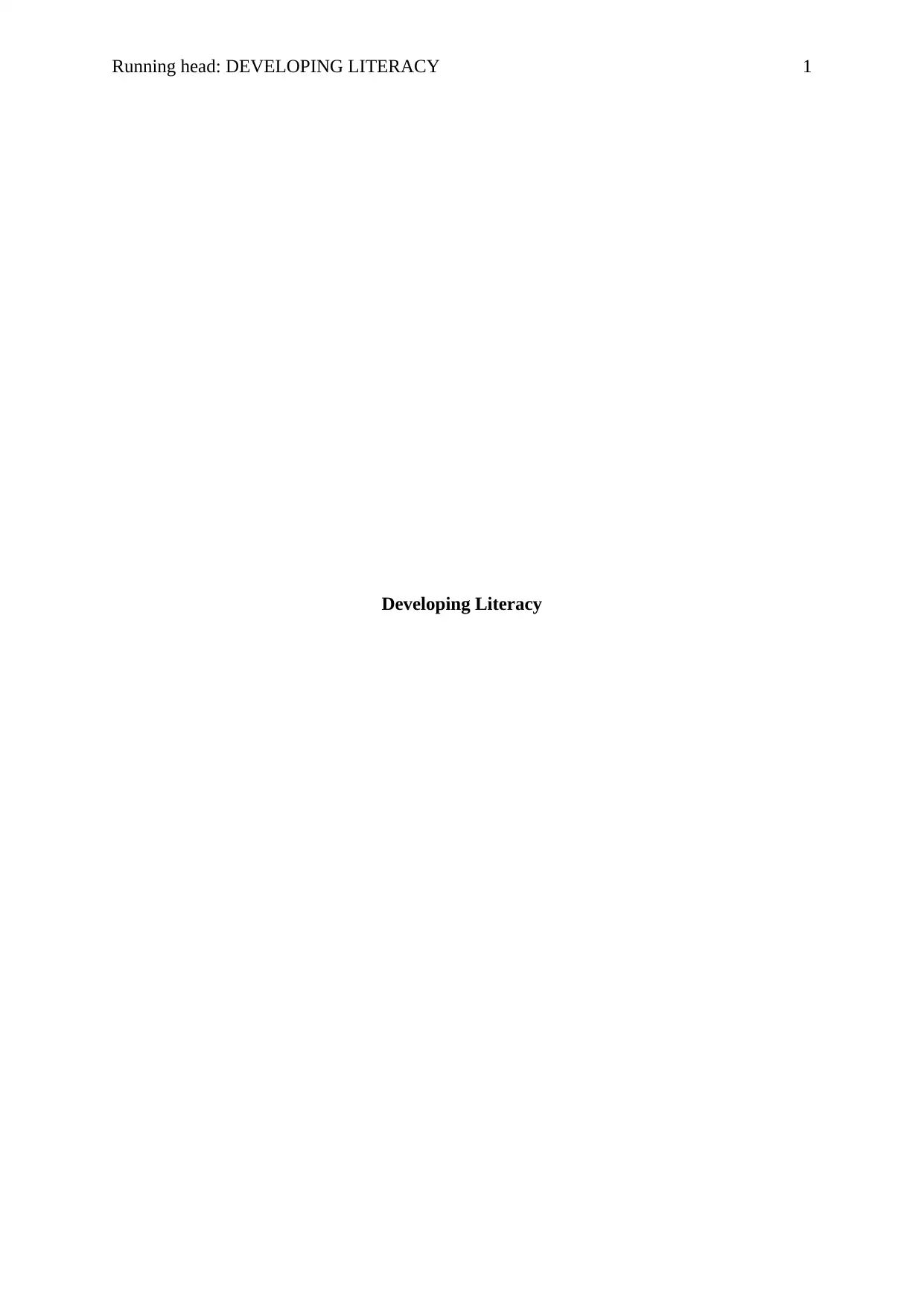
Running head: DEVELOPING LITERACY 1
Developing Literacy
Developing Literacy
Paraphrase This Document
Need a fresh take? Get an instant paraphrase of this document with our AI Paraphraser
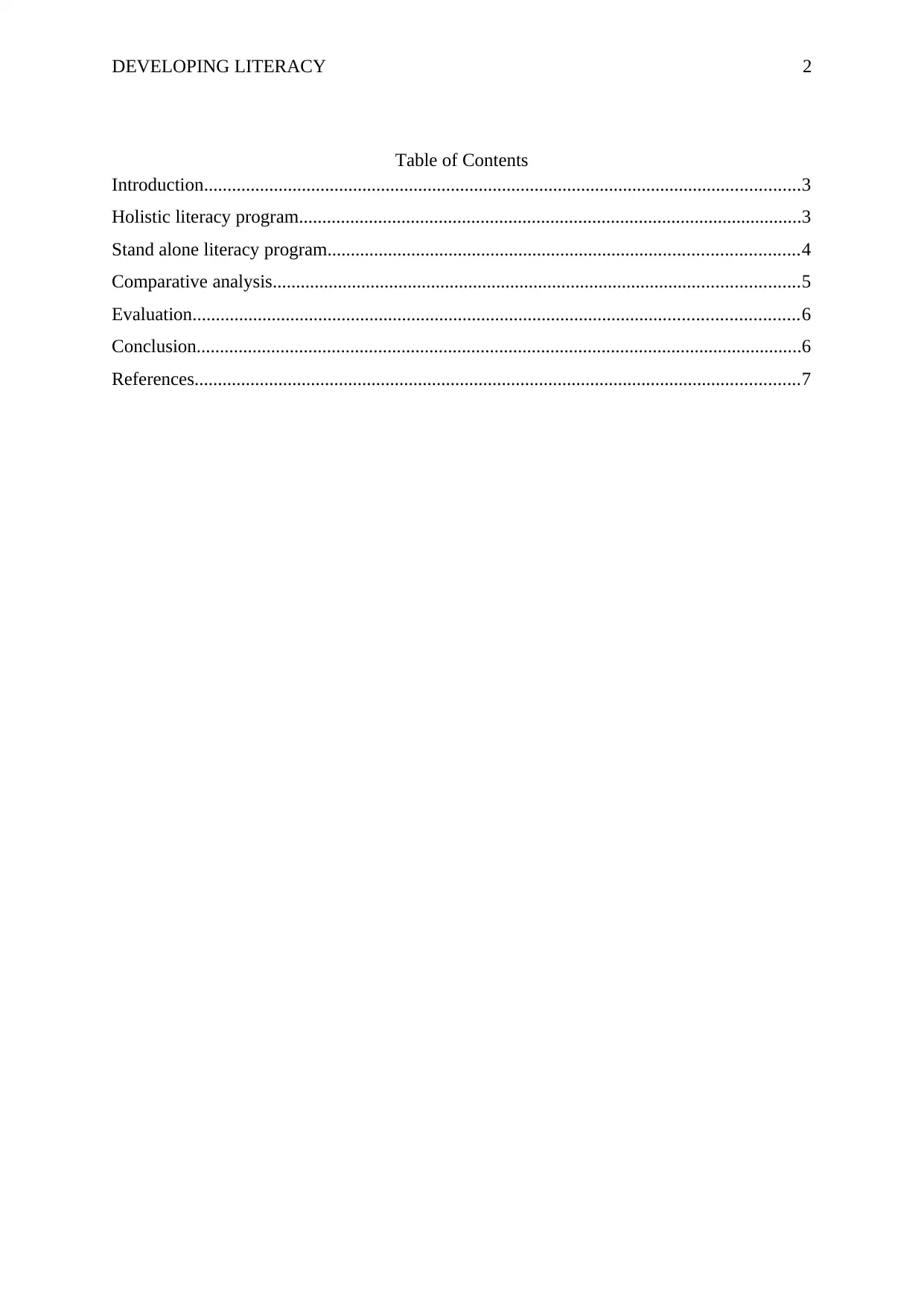
DEVELOPING LITERACY 2
Table of Contents
Introduction................................................................................................................................3
Holistic literacy program............................................................................................................3
Stand alone literacy program.....................................................................................................4
Comparative analysis.................................................................................................................5
Evaluation..................................................................................................................................6
Conclusion..................................................................................................................................6
References..................................................................................................................................7
Table of Contents
Introduction................................................................................................................................3
Holistic literacy program............................................................................................................3
Stand alone literacy program.....................................................................................................4
Comparative analysis.................................................................................................................5
Evaluation..................................................................................................................................6
Conclusion..................................................................................................................................6
References..................................................................................................................................7
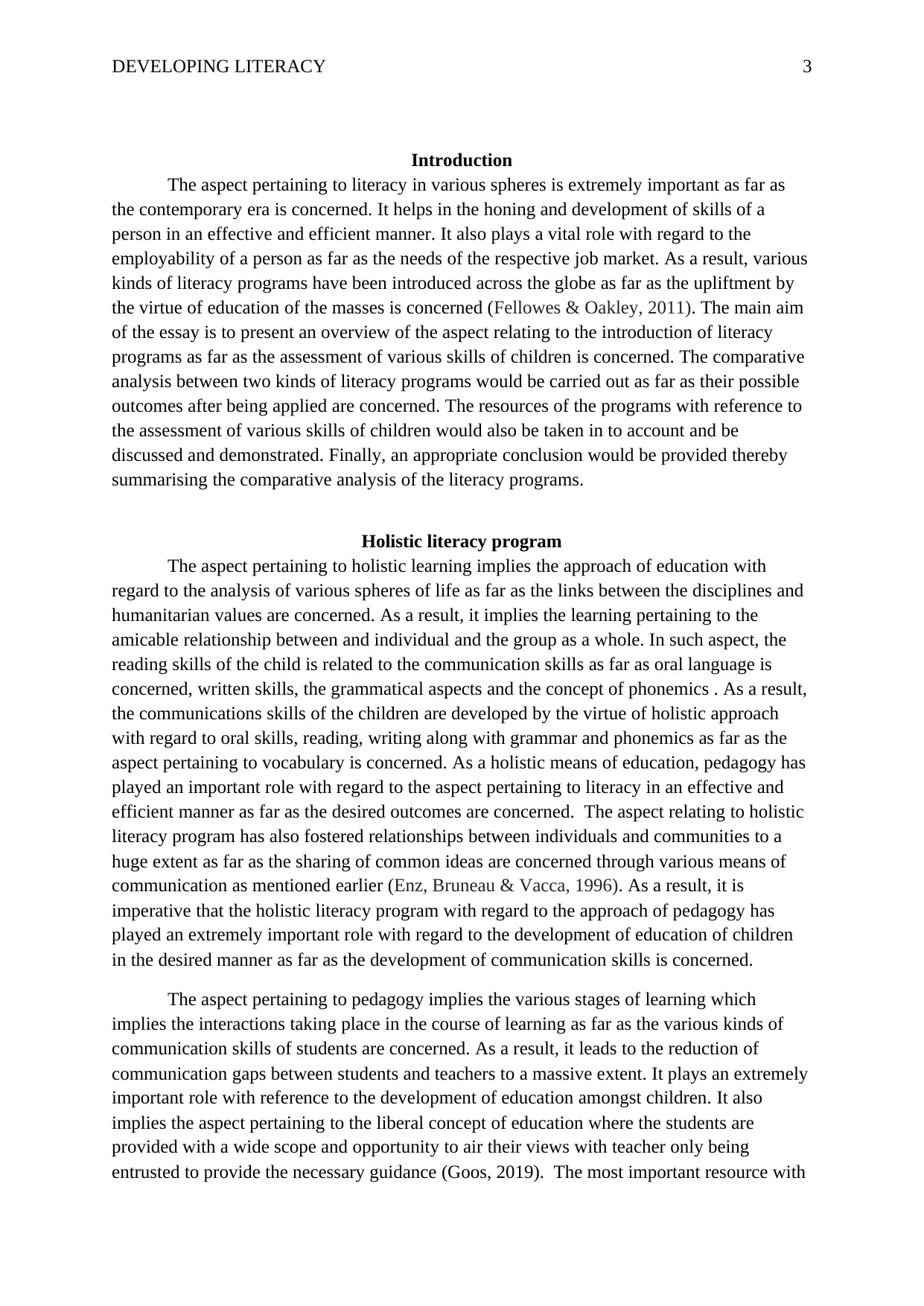
DEVELOPING LITERACY 3
Introduction
The aspect pertaining to literacy in various spheres is extremely important as far as
the contemporary era is concerned. It helps in the honing and development of skills of a
person in an effective and efficient manner. It also plays a vital role with regard to the
employability of a person as far as the needs of the respective job market. As a result, various
kinds of literacy programs have been introduced across the globe as far as the upliftment by
the virtue of education of the masses is concerned (Fellowes & Oakley, 2011). The main aim
of the essay is to present an overview of the aspect relating to the introduction of literacy
programs as far as the assessment of various skills of children is concerned. The comparative
analysis between two kinds of literacy programs would be carried out as far as their possible
outcomes after being applied are concerned. The resources of the programs with reference to
the assessment of various skills of children would also be taken in to account and be
discussed and demonstrated. Finally, an appropriate conclusion would be provided thereby
summarising the comparative analysis of the literacy programs.
Holistic literacy program
The aspect pertaining to holistic learning implies the approach of education with
regard to the analysis of various spheres of life as far as the links between the disciplines and
humanitarian values are concerned. As a result, it implies the learning pertaining to the
amicable relationship between and individual and the group as a whole. In such aspect, the
reading skills of the child is related to the communication skills as far as oral language is
concerned, written skills, the grammatical aspects and the concept of phonemics . As a result,
the communications skills of the children are developed by the virtue of holistic approach
with regard to oral skills, reading, writing along with grammar and phonemics as far as the
aspect pertaining to vocabulary is concerned. As a holistic means of education, pedagogy has
played an important role with regard to the aspect pertaining to literacy in an effective and
efficient manner as far as the desired outcomes are concerned. The aspect relating to holistic
literacy program has also fostered relationships between individuals and communities to a
huge extent as far as the sharing of common ideas are concerned through various means of
communication as mentioned earlier (Enz, Bruneau & Vacca, 1996). As a result, it is
imperative that the holistic literacy program with regard to the approach of pedagogy has
played an extremely important role with regard to the development of education of children
in the desired manner as far as the development of communication skills is concerned.
The aspect pertaining to pedagogy implies the various stages of learning which
implies the interactions taking place in the course of learning as far as the various kinds of
communication skills of students are concerned. As a result, it leads to the reduction of
communication gaps between students and teachers to a massive extent. It plays an extremely
important role with reference to the development of education amongst children. It also
implies the aspect pertaining to the liberal concept of education where the students are
provided with a wide scope and opportunity to air their views with teacher only being
entrusted to provide the necessary guidance (Goos, 2019). The most important resource with
Introduction
The aspect pertaining to literacy in various spheres is extremely important as far as
the contemporary era is concerned. It helps in the honing and development of skills of a
person in an effective and efficient manner. It also plays a vital role with regard to the
employability of a person as far as the needs of the respective job market. As a result, various
kinds of literacy programs have been introduced across the globe as far as the upliftment by
the virtue of education of the masses is concerned (Fellowes & Oakley, 2011). The main aim
of the essay is to present an overview of the aspect relating to the introduction of literacy
programs as far as the assessment of various skills of children is concerned. The comparative
analysis between two kinds of literacy programs would be carried out as far as their possible
outcomes after being applied are concerned. The resources of the programs with reference to
the assessment of various skills of children would also be taken in to account and be
discussed and demonstrated. Finally, an appropriate conclusion would be provided thereby
summarising the comparative analysis of the literacy programs.
Holistic literacy program
The aspect pertaining to holistic learning implies the approach of education with
regard to the analysis of various spheres of life as far as the links between the disciplines and
humanitarian values are concerned. As a result, it implies the learning pertaining to the
amicable relationship between and individual and the group as a whole. In such aspect, the
reading skills of the child is related to the communication skills as far as oral language is
concerned, written skills, the grammatical aspects and the concept of phonemics . As a result,
the communications skills of the children are developed by the virtue of holistic approach
with regard to oral skills, reading, writing along with grammar and phonemics as far as the
aspect pertaining to vocabulary is concerned. As a holistic means of education, pedagogy has
played an important role with regard to the aspect pertaining to literacy in an effective and
efficient manner as far as the desired outcomes are concerned. The aspect relating to holistic
literacy program has also fostered relationships between individuals and communities to a
huge extent as far as the sharing of common ideas are concerned through various means of
communication as mentioned earlier (Enz, Bruneau & Vacca, 1996). As a result, it is
imperative that the holistic literacy program with regard to the approach of pedagogy has
played an extremely important role with regard to the development of education of children
in the desired manner as far as the development of communication skills is concerned.
The aspect pertaining to pedagogy implies the various stages of learning which
implies the interactions taking place in the course of learning as far as the various kinds of
communication skills of students are concerned. As a result, it leads to the reduction of
communication gaps between students and teachers to a massive extent. It plays an extremely
important role with reference to the development of education amongst children. It also
implies the aspect pertaining to the liberal concept of education where the students are
provided with a wide scope and opportunity to air their views with teacher only being
entrusted to provide the necessary guidance (Goos, 2019). The most important resource with
⊘ This is a preview!⊘
Do you want full access?
Subscribe today to unlock all pages.

Trusted by 1+ million students worldwide
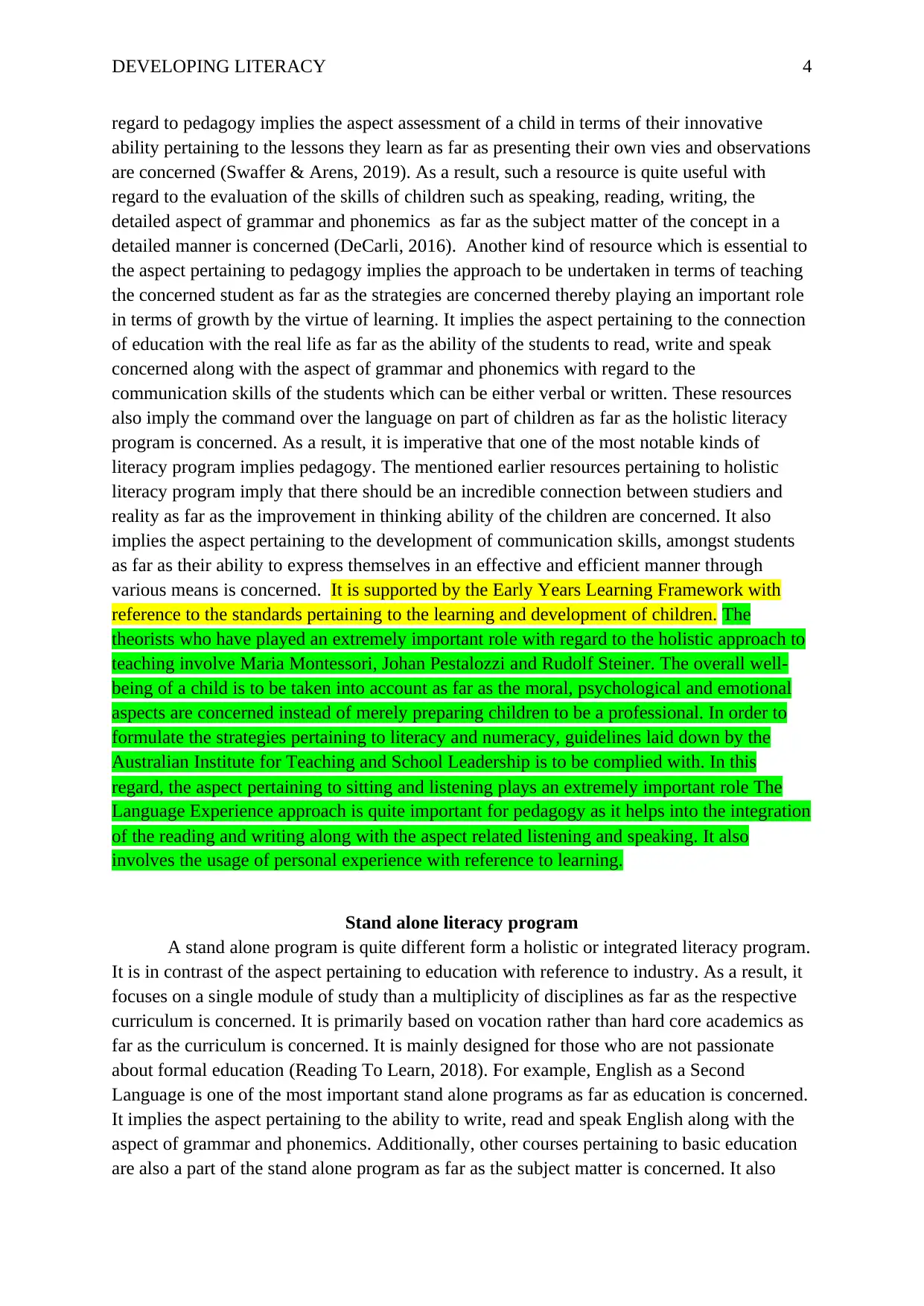
DEVELOPING LITERACY 4
regard to pedagogy implies the aspect assessment of a child in terms of their innovative
ability pertaining to the lessons they learn as far as presenting their own vies and observations
are concerned (Swaffer & Arens, 2019). As a result, such a resource is quite useful with
regard to the evaluation of the skills of children such as speaking, reading, writing, the
detailed aspect of grammar and phonemics as far as the subject matter of the concept in a
detailed manner is concerned (DeCarli, 2016). Another kind of resource which is essential to
the aspect pertaining to pedagogy implies the approach to be undertaken in terms of teaching
the concerned student as far as the strategies are concerned thereby playing an important role
in terms of growth by the virtue of learning. It implies the aspect pertaining to the connection
of education with the real life as far as the ability of the students to read, write and speak
concerned along with the aspect of grammar and phonemics with regard to the
communication skills of the students which can be either verbal or written. These resources
also imply the command over the language on part of children as far as the holistic literacy
program is concerned. As a result, it is imperative that one of the most notable kinds of
literacy program implies pedagogy. The mentioned earlier resources pertaining to holistic
literacy program imply that there should be an incredible connection between studiers and
reality as far as the improvement in thinking ability of the children are concerned. It also
implies the aspect pertaining to the development of communication skills, amongst students
as far as their ability to express themselves in an effective and efficient manner through
various means is concerned. It is supported by the Early Years Learning Framework with
reference to the standards pertaining to the learning and development of children. The
theorists who have played an extremely important role with regard to the holistic approach to
teaching involve Maria Montessori, Johan Pestalozzi and Rudolf Steiner. The overall well-
being of a child is to be taken into account as far as the moral, psychological and emotional
aspects are concerned instead of merely preparing children to be a professional. In order to
formulate the strategies pertaining to literacy and numeracy, guidelines laid down by the
Australian Institute for Teaching and School Leadership is to be complied with. In this
regard, the aspect pertaining to sitting and listening plays an extremely important role The
Language Experience approach is quite important for pedagogy as it helps into the integration
of the reading and writing along with the aspect related listening and speaking. It also
involves the usage of personal experience with reference to learning.
Stand alone literacy program
A stand alone program is quite different form a holistic or integrated literacy program.
It is in contrast of the aspect pertaining to education with reference to industry. As a result, it
focuses on a single module of study than a multiplicity of disciplines as far as the respective
curriculum is concerned. It is primarily based on vocation rather than hard core academics as
far as the curriculum is concerned. It is mainly designed for those who are not passionate
about formal education (Reading To Learn, 2018). For example, English as a Second
Language is one of the most important stand alone programs as far as education is concerned.
It implies the aspect pertaining to the ability to write, read and speak English along with the
aspect of grammar and phonemics. Additionally, other courses pertaining to basic education
are also a part of the stand alone program as far as the subject matter is concerned. It also
regard to pedagogy implies the aspect assessment of a child in terms of their innovative
ability pertaining to the lessons they learn as far as presenting their own vies and observations
are concerned (Swaffer & Arens, 2019). As a result, such a resource is quite useful with
regard to the evaluation of the skills of children such as speaking, reading, writing, the
detailed aspect of grammar and phonemics as far as the subject matter of the concept in a
detailed manner is concerned (DeCarli, 2016). Another kind of resource which is essential to
the aspect pertaining to pedagogy implies the approach to be undertaken in terms of teaching
the concerned student as far as the strategies are concerned thereby playing an important role
in terms of growth by the virtue of learning. It implies the aspect pertaining to the connection
of education with the real life as far as the ability of the students to read, write and speak
concerned along with the aspect of grammar and phonemics with regard to the
communication skills of the students which can be either verbal or written. These resources
also imply the command over the language on part of children as far as the holistic literacy
program is concerned. As a result, it is imperative that one of the most notable kinds of
literacy program implies pedagogy. The mentioned earlier resources pertaining to holistic
literacy program imply that there should be an incredible connection between studiers and
reality as far as the improvement in thinking ability of the children are concerned. It also
implies the aspect pertaining to the development of communication skills, amongst students
as far as their ability to express themselves in an effective and efficient manner through
various means is concerned. It is supported by the Early Years Learning Framework with
reference to the standards pertaining to the learning and development of children. The
theorists who have played an extremely important role with regard to the holistic approach to
teaching involve Maria Montessori, Johan Pestalozzi and Rudolf Steiner. The overall well-
being of a child is to be taken into account as far as the moral, psychological and emotional
aspects are concerned instead of merely preparing children to be a professional. In order to
formulate the strategies pertaining to literacy and numeracy, guidelines laid down by the
Australian Institute for Teaching and School Leadership is to be complied with. In this
regard, the aspect pertaining to sitting and listening plays an extremely important role The
Language Experience approach is quite important for pedagogy as it helps into the integration
of the reading and writing along with the aspect related listening and speaking. It also
involves the usage of personal experience with reference to learning.
Stand alone literacy program
A stand alone program is quite different form a holistic or integrated literacy program.
It is in contrast of the aspect pertaining to education with reference to industry. As a result, it
focuses on a single module of study than a multiplicity of disciplines as far as the respective
curriculum is concerned. It is primarily based on vocation rather than hard core academics as
far as the curriculum is concerned. It is mainly designed for those who are not passionate
about formal education (Reading To Learn, 2018). For example, English as a Second
Language is one of the most important stand alone programs as far as education is concerned.
It implies the aspect pertaining to the ability to write, read and speak English along with the
aspect of grammar and phonemics. Additionally, other courses pertaining to basic education
are also a part of the stand alone program as far as the subject matter is concerned. It also
Paraphrase This Document
Need a fresh take? Get an instant paraphrase of this document with our AI Paraphraser
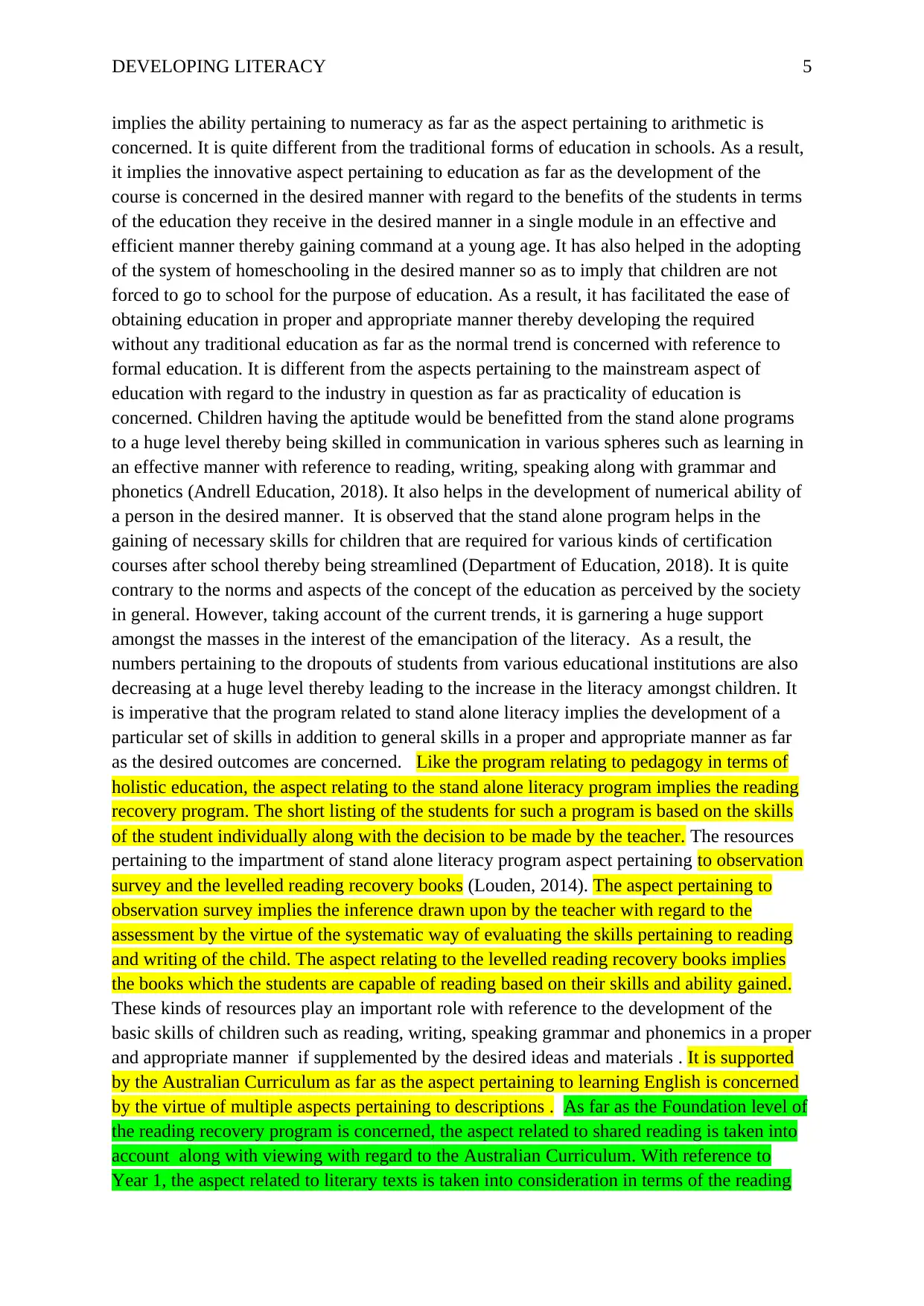
DEVELOPING LITERACY 5
implies the ability pertaining to numeracy as far as the aspect pertaining to arithmetic is
concerned. It is quite different from the traditional forms of education in schools. As a result,
it implies the innovative aspect pertaining to education as far as the development of the
course is concerned in the desired manner with regard to the benefits of the students in terms
of the education they receive in the desired manner in a single module in an effective and
efficient manner thereby gaining command at a young age. It has also helped in the adopting
of the system of homeschooling in the desired manner so as to imply that children are not
forced to go to school for the purpose of education. As a result, it has facilitated the ease of
obtaining education in proper and appropriate manner thereby developing the required
without any traditional education as far as the normal trend is concerned with reference to
formal education. It is different from the aspects pertaining to the mainstream aspect of
education with regard to the industry in question as far as practicality of education is
concerned. Children having the aptitude would be benefitted from the stand alone programs
to a huge level thereby being skilled in communication in various spheres such as learning in
an effective manner with reference to reading, writing, speaking along with grammar and
phonetics (Andrell Education, 2018). It also helps in the development of numerical ability of
a person in the desired manner. It is observed that the stand alone program helps in the
gaining of necessary skills for children that are required for various kinds of certification
courses after school thereby being streamlined (Department of Education, 2018). It is quite
contrary to the norms and aspects of the concept of the education as perceived by the society
in general. However, taking account of the current trends, it is garnering a huge support
amongst the masses in the interest of the emancipation of the literacy. As a result, the
numbers pertaining to the dropouts of students from various educational institutions are also
decreasing at a huge level thereby leading to the increase in the literacy amongst children. It
is imperative that the program related to stand alone literacy implies the development of a
particular set of skills in addition to general skills in a proper and appropriate manner as far
as the desired outcomes are concerned. Like the program relating to pedagogy in terms of
holistic education, the aspect relating to the stand alone literacy program implies the reading
recovery program. The short listing of the students for such a program is based on the skills
of the student individually along with the decision to be made by the teacher. The resources
pertaining to the impartment of stand alone literacy program aspect pertaining to observation
survey and the levelled reading recovery books (Louden, 2014). The aspect pertaining to
observation survey implies the inference drawn upon by the teacher with regard to the
assessment by the virtue of the systematic way of evaluating the skills pertaining to reading
and writing of the child. The aspect relating to the levelled reading recovery books implies
the books which the students are capable of reading based on their skills and ability gained.
These kinds of resources play an important role with reference to the development of the
basic skills of children such as reading, writing, speaking grammar and phonemics in a proper
and appropriate manner if supplemented by the desired ideas and materials . It is supported
by the Australian Curriculum as far as the aspect pertaining to learning English is concerned
by the virtue of multiple aspects pertaining to descriptions . As far as the Foundation level of
the reading recovery program is concerned, the aspect related to shared reading is taken into
account along with viewing with regard to the Australian Curriculum. With reference to
Year 1, the aspect related to literary texts is taken into consideration in terms of the reading
implies the ability pertaining to numeracy as far as the aspect pertaining to arithmetic is
concerned. It is quite different from the traditional forms of education in schools. As a result,
it implies the innovative aspect pertaining to education as far as the development of the
course is concerned in the desired manner with regard to the benefits of the students in terms
of the education they receive in the desired manner in a single module in an effective and
efficient manner thereby gaining command at a young age. It has also helped in the adopting
of the system of homeschooling in the desired manner so as to imply that children are not
forced to go to school for the purpose of education. As a result, it has facilitated the ease of
obtaining education in proper and appropriate manner thereby developing the required
without any traditional education as far as the normal trend is concerned with reference to
formal education. It is different from the aspects pertaining to the mainstream aspect of
education with regard to the industry in question as far as practicality of education is
concerned. Children having the aptitude would be benefitted from the stand alone programs
to a huge level thereby being skilled in communication in various spheres such as learning in
an effective manner with reference to reading, writing, speaking along with grammar and
phonetics (Andrell Education, 2018). It also helps in the development of numerical ability of
a person in the desired manner. It is observed that the stand alone program helps in the
gaining of necessary skills for children that are required for various kinds of certification
courses after school thereby being streamlined (Department of Education, 2018). It is quite
contrary to the norms and aspects of the concept of the education as perceived by the society
in general. However, taking account of the current trends, it is garnering a huge support
amongst the masses in the interest of the emancipation of the literacy. As a result, the
numbers pertaining to the dropouts of students from various educational institutions are also
decreasing at a huge level thereby leading to the increase in the literacy amongst children. It
is imperative that the program related to stand alone literacy implies the development of a
particular set of skills in addition to general skills in a proper and appropriate manner as far
as the desired outcomes are concerned. Like the program relating to pedagogy in terms of
holistic education, the aspect relating to the stand alone literacy program implies the reading
recovery program. The short listing of the students for such a program is based on the skills
of the student individually along with the decision to be made by the teacher. The resources
pertaining to the impartment of stand alone literacy program aspect pertaining to observation
survey and the levelled reading recovery books (Louden, 2014). The aspect pertaining to
observation survey implies the inference drawn upon by the teacher with regard to the
assessment by the virtue of the systematic way of evaluating the skills pertaining to reading
and writing of the child. The aspect relating to the levelled reading recovery books implies
the books which the students are capable of reading based on their skills and ability gained.
These kinds of resources play an important role with reference to the development of the
basic skills of children such as reading, writing, speaking grammar and phonemics in a proper
and appropriate manner if supplemented by the desired ideas and materials . It is supported
by the Australian Curriculum as far as the aspect pertaining to learning English is concerned
by the virtue of multiple aspects pertaining to descriptions . As far as the Foundation level of
the reading recovery program is concerned, the aspect related to shared reading is taken into
account along with viewing with regard to the Australian Curriculum. With reference to
Year 1, the aspect related to literary texts is taken into consideration in terms of the reading
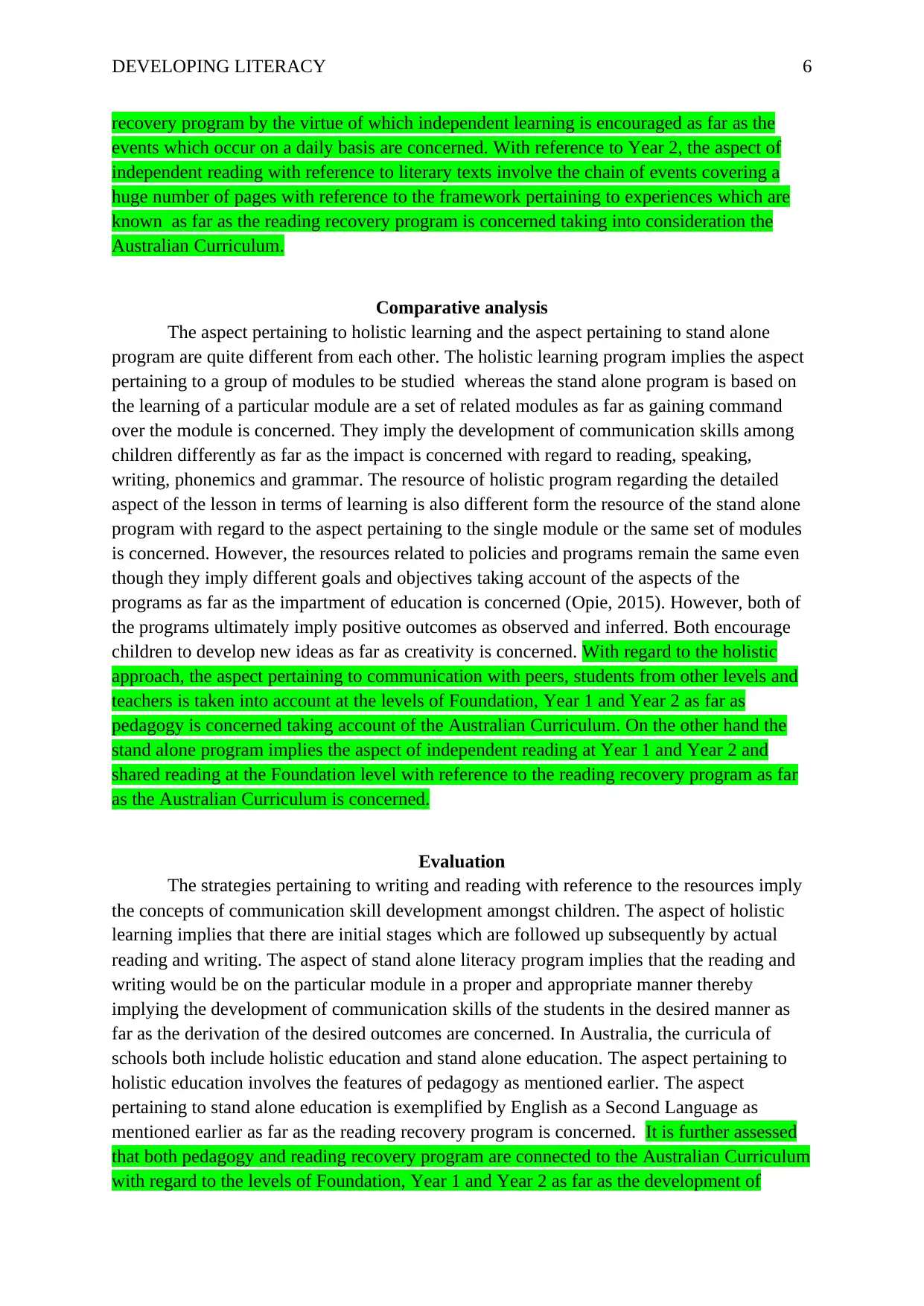
DEVELOPING LITERACY 6
recovery program by the virtue of which independent learning is encouraged as far as the
events which occur on a daily basis are concerned. With reference to Year 2, the aspect of
independent reading with reference to literary texts involve the chain of events covering a
huge number of pages with reference to the framework pertaining to experiences which are
known as far as the reading recovery program is concerned taking into consideration the
Australian Curriculum.
Comparative analysis
The aspect pertaining to holistic learning and the aspect pertaining to stand alone
program are quite different from each other. The holistic learning program implies the aspect
pertaining to a group of modules to be studied whereas the stand alone program is based on
the learning of a particular module are a set of related modules as far as gaining command
over the module is concerned. They imply the development of communication skills among
children differently as far as the impact is concerned with regard to reading, speaking,
writing, phonemics and grammar. The resource of holistic program regarding the detailed
aspect of the lesson in terms of learning is also different form the resource of the stand alone
program with regard to the aspect pertaining to the single module or the same set of modules
is concerned. However, the resources related to policies and programs remain the same even
though they imply different goals and objectives taking account of the aspects of the
programs as far as the impartment of education is concerned (Opie, 2015). However, both of
the programs ultimately imply positive outcomes as observed and inferred. Both encourage
children to develop new ideas as far as creativity is concerned. With regard to the holistic
approach, the aspect pertaining to communication with peers, students from other levels and
teachers is taken into account at the levels of Foundation, Year 1 and Year 2 as far as
pedagogy is concerned taking account of the Australian Curriculum. On the other hand the
stand alone program implies the aspect of independent reading at Year 1 and Year 2 and
shared reading at the Foundation level with reference to the reading recovery program as far
as the Australian Curriculum is concerned.
Evaluation
The strategies pertaining to writing and reading with reference to the resources imply
the concepts of communication skill development amongst children. The aspect of holistic
learning implies that there are initial stages which are followed up subsequently by actual
reading and writing. The aspect of stand alone literacy program implies that the reading and
writing would be on the particular module in a proper and appropriate manner thereby
implying the development of communication skills of the students in the desired manner as
far as the derivation of the desired outcomes are concerned. In Australia, the curricula of
schools both include holistic education and stand alone education. The aspect pertaining to
holistic education involves the features of pedagogy as mentioned earlier. The aspect
pertaining to stand alone education is exemplified by English as a Second Language as
mentioned earlier as far as the reading recovery program is concerned. It is further assessed
that both pedagogy and reading recovery program are connected to the Australian Curriculum
with regard to the levels of Foundation, Year 1 and Year 2 as far as the development of
recovery program by the virtue of which independent learning is encouraged as far as the
events which occur on a daily basis are concerned. With reference to Year 2, the aspect of
independent reading with reference to literary texts involve the chain of events covering a
huge number of pages with reference to the framework pertaining to experiences which are
known as far as the reading recovery program is concerned taking into consideration the
Australian Curriculum.
Comparative analysis
The aspect pertaining to holistic learning and the aspect pertaining to stand alone
program are quite different from each other. The holistic learning program implies the aspect
pertaining to a group of modules to be studied whereas the stand alone program is based on
the learning of a particular module are a set of related modules as far as gaining command
over the module is concerned. They imply the development of communication skills among
children differently as far as the impact is concerned with regard to reading, speaking,
writing, phonemics and grammar. The resource of holistic program regarding the detailed
aspect of the lesson in terms of learning is also different form the resource of the stand alone
program with regard to the aspect pertaining to the single module or the same set of modules
is concerned. However, the resources related to policies and programs remain the same even
though they imply different goals and objectives taking account of the aspects of the
programs as far as the impartment of education is concerned (Opie, 2015). However, both of
the programs ultimately imply positive outcomes as observed and inferred. Both encourage
children to develop new ideas as far as creativity is concerned. With regard to the holistic
approach, the aspect pertaining to communication with peers, students from other levels and
teachers is taken into account at the levels of Foundation, Year 1 and Year 2 as far as
pedagogy is concerned taking account of the Australian Curriculum. On the other hand the
stand alone program implies the aspect of independent reading at Year 1 and Year 2 and
shared reading at the Foundation level with reference to the reading recovery program as far
as the Australian Curriculum is concerned.
Evaluation
The strategies pertaining to writing and reading with reference to the resources imply
the concepts of communication skill development amongst children. The aspect of holistic
learning implies that there are initial stages which are followed up subsequently by actual
reading and writing. The aspect of stand alone literacy program implies that the reading and
writing would be on the particular module in a proper and appropriate manner thereby
implying the development of communication skills of the students in the desired manner as
far as the derivation of the desired outcomes are concerned. In Australia, the curricula of
schools both include holistic education and stand alone education. The aspect pertaining to
holistic education involves the features of pedagogy as mentioned earlier. The aspect
pertaining to stand alone education is exemplified by English as a Second Language as
mentioned earlier as far as the reading recovery program is concerned. It is further assessed
that both pedagogy and reading recovery program are connected to the Australian Curriculum
with regard to the levels of Foundation, Year 1 and Year 2 as far as the development of
⊘ This is a preview!⊘
Do you want full access?
Subscribe today to unlock all pages.

Trusted by 1+ million students worldwide
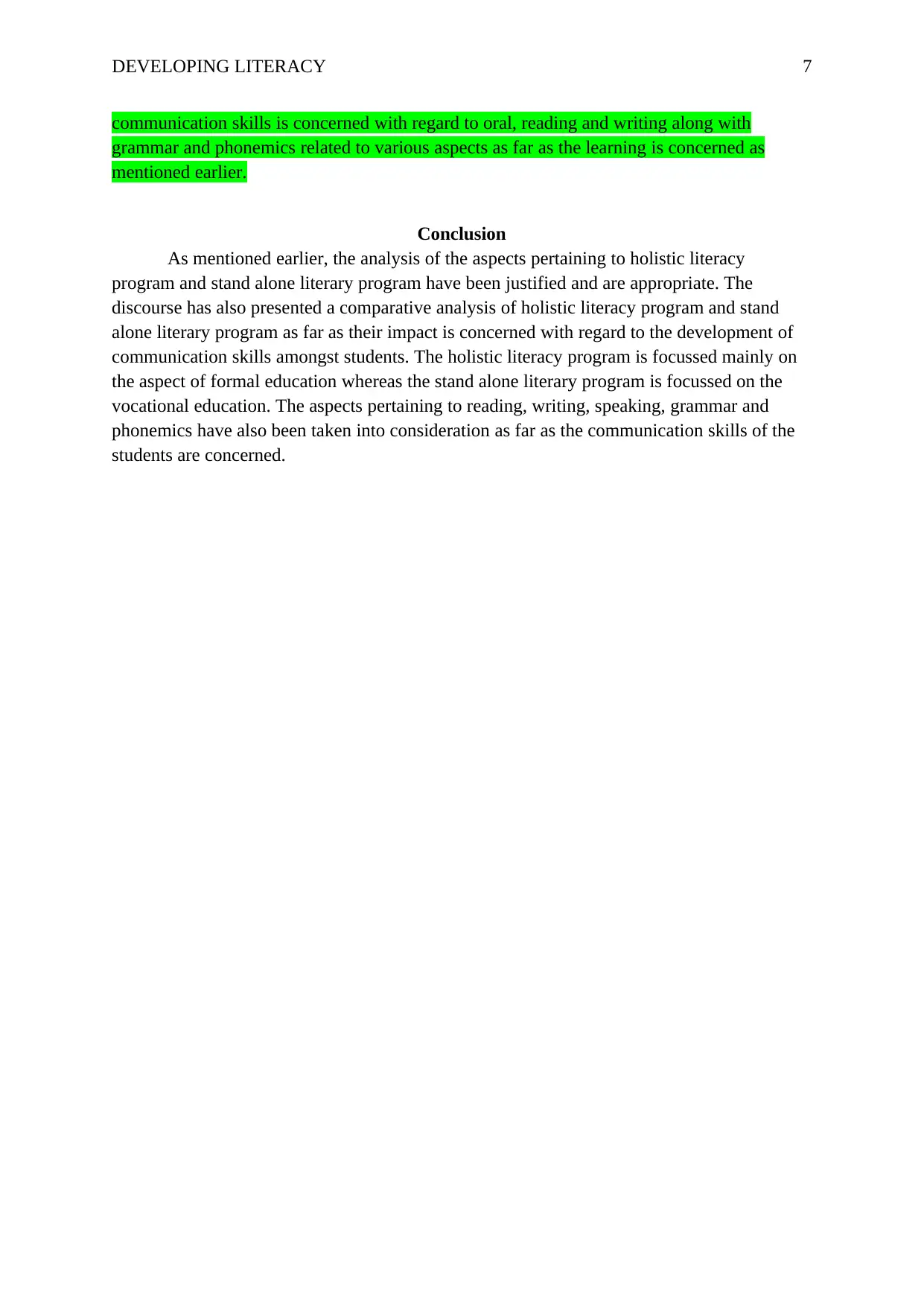
DEVELOPING LITERACY 7
communication skills is concerned with regard to oral, reading and writing along with
grammar and phonemics related to various aspects as far as the learning is concerned as
mentioned earlier.
Conclusion
As mentioned earlier, the analysis of the aspects pertaining to holistic literacy
program and stand alone literary program have been justified and are appropriate. The
discourse has also presented a comparative analysis of holistic literacy program and stand
alone literary program as far as their impact is concerned with regard to the development of
communication skills amongst students. The holistic literacy program is focussed mainly on
the aspect of formal education whereas the stand alone literary program is focussed on the
vocational education. The aspects pertaining to reading, writing, speaking, grammar and
phonemics have also been taken into consideration as far as the communication skills of the
students are concerned.
communication skills is concerned with regard to oral, reading and writing along with
grammar and phonemics related to various aspects as far as the learning is concerned as
mentioned earlier.
Conclusion
As mentioned earlier, the analysis of the aspects pertaining to holistic literacy
program and stand alone literary program have been justified and are appropriate. The
discourse has also presented a comparative analysis of holistic literacy program and stand
alone literary program as far as their impact is concerned with regard to the development of
communication skills amongst students. The holistic literacy program is focussed mainly on
the aspect of formal education whereas the stand alone literary program is focussed on the
vocational education. The aspects pertaining to reading, writing, speaking, grammar and
phonemics have also been taken into consideration as far as the communication skills of the
students are concerned.
Paraphrase This Document
Need a fresh take? Get an instant paraphrase of this document with our AI Paraphraser
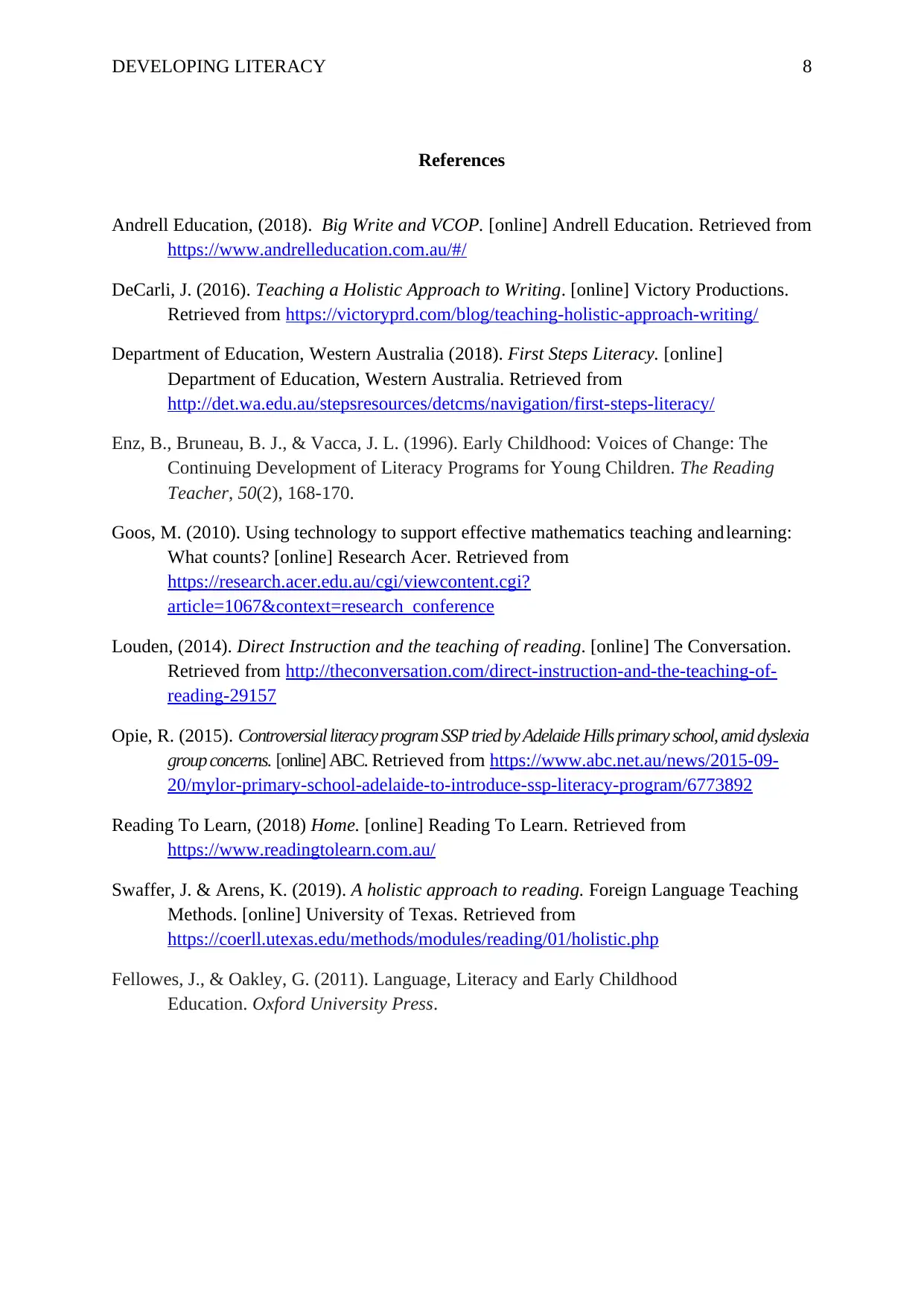
DEVELOPING LITERACY 8
References
Andrell Education, (2018). Big Write and VCOP. [online] Andrell Education. Retrieved from
https://www.andrelleducation.com.au/#/
DeCarli, J. (2016). Teaching a Holistic Approach to Writing. [online] Victory Productions.
Retrieved from https://victoryprd.com/blog/teaching-holistic-approach-writing/
Department of Education, Western Australia (2018). First Steps Literacy. [online]
Department of Education, Western Australia. Retrieved from
http://det.wa.edu.au/stepsresources/detcms/navigation/first-steps-literacy/
Enz, B., Bruneau, B. J., & Vacca, J. L. (1996). Early Childhood: Voices of Change: The
Continuing Development of Literacy Programs for Young Children. The Reading
Teacher, 50(2), 168-170.
Goos, M. (2010). Using technology to support effective mathematics teaching and learning:
What counts? [online] Research Acer. Retrieved from
https://research.acer.edu.au/cgi/viewcontent.cgi?
article=1067&context=research_conference
Louden, (2014). Direct Instruction and the teaching of reading. [online] The Conversation.
Retrieved from http://theconversation.com/direct-instruction-and-the-teaching-of-
reading-29157
Opie, R. (2015). Controversial literacy program SSP tried by Adelaide Hills primary school, amid dyslexia
group concerns. [online] ABC. Retrieved from https://www.abc.net.au/news/2015-09-
20/mylor-primary-school-adelaide-to-introduce-ssp-literacy-program/6773892
Reading To Learn, (2018) Home. [online] Reading To Learn. Retrieved from
https://www.readingtolearn.com.au/
Swaffer, J. & Arens, K. (2019). A holistic approach to reading. Foreign Language Teaching
Methods. [online] University of Texas. Retrieved from
https://coerll.utexas.edu/methods/modules/reading/01/holistic.php
Fellowes, J., & Oakley, G. (2011). Language, Literacy and Early Childhood
Education. Oxford University Press.
References
Andrell Education, (2018). Big Write and VCOP. [online] Andrell Education. Retrieved from
https://www.andrelleducation.com.au/#/
DeCarli, J. (2016). Teaching a Holistic Approach to Writing. [online] Victory Productions.
Retrieved from https://victoryprd.com/blog/teaching-holistic-approach-writing/
Department of Education, Western Australia (2018). First Steps Literacy. [online]
Department of Education, Western Australia. Retrieved from
http://det.wa.edu.au/stepsresources/detcms/navigation/first-steps-literacy/
Enz, B., Bruneau, B. J., & Vacca, J. L. (1996). Early Childhood: Voices of Change: The
Continuing Development of Literacy Programs for Young Children. The Reading
Teacher, 50(2), 168-170.
Goos, M. (2010). Using technology to support effective mathematics teaching and learning:
What counts? [online] Research Acer. Retrieved from
https://research.acer.edu.au/cgi/viewcontent.cgi?
article=1067&context=research_conference
Louden, (2014). Direct Instruction and the teaching of reading. [online] The Conversation.
Retrieved from http://theconversation.com/direct-instruction-and-the-teaching-of-
reading-29157
Opie, R. (2015). Controversial literacy program SSP tried by Adelaide Hills primary school, amid dyslexia
group concerns. [online] ABC. Retrieved from https://www.abc.net.au/news/2015-09-
20/mylor-primary-school-adelaide-to-introduce-ssp-literacy-program/6773892
Reading To Learn, (2018) Home. [online] Reading To Learn. Retrieved from
https://www.readingtolearn.com.au/
Swaffer, J. & Arens, K. (2019). A holistic approach to reading. Foreign Language Teaching
Methods. [online] University of Texas. Retrieved from
https://coerll.utexas.edu/methods/modules/reading/01/holistic.php
Fellowes, J., & Oakley, G. (2011). Language, Literacy and Early Childhood
Education. Oxford University Press.
1 out of 8
Related Documents
Your All-in-One AI-Powered Toolkit for Academic Success.
+13062052269
info@desklib.com
Available 24*7 on WhatsApp / Email
![[object Object]](/_next/static/media/star-bottom.7253800d.svg)
Unlock your academic potential
Copyright © 2020–2026 A2Z Services. All Rights Reserved. Developed and managed by ZUCOL.





